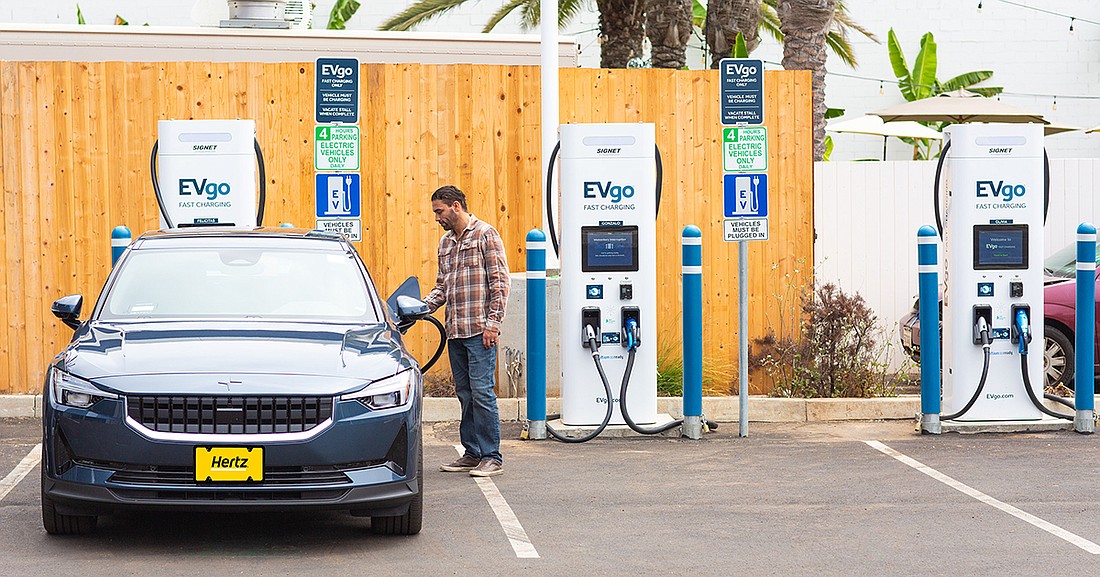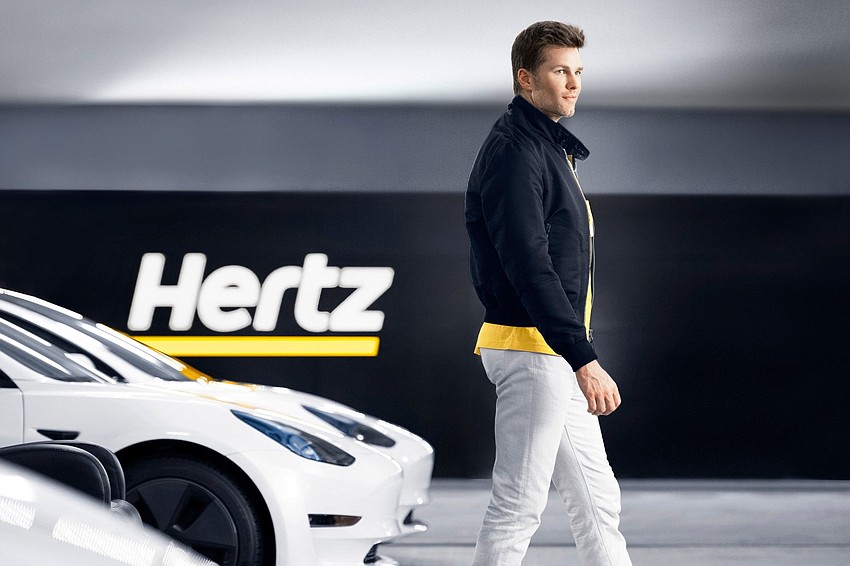- July 26, 2024
-
-
Loading

Loading
 Courtesy image
Courtesy image
The jolt of providing customers electric vehicles at Hertz to rent is losing some of its power, as the company recently announced it will sell off 20,000 vehicles. The move comes a bit more than two years after Hertz, then not far removed from its historic bankruptcy filing, announced a major investment in Tesla and signed one of the world’s most famous athletes to promote its initiative.
In a U.S. Securities and Exchange Commission filing Jan. 11, the Estero-based car rental company announced it was getting rid of the vehicles by the end of the year as it looks to eliminate a “disproportionate number of lower margin rentals and reduce damage expenses associated with EVs.”
A portion of the proceeds will go toward buying gasoline-powered vehicles.
The move away from electric vehicles and back to gas powered follows an announcement in October 2021 that Hertz was buying 100,000 Tesla’s and that it would install 3,000 EV charging stations across its operations worldwide to support the fleet. At the time, it announced NFL quarterback Tom Brady — then playing for the Tampa Bay Buccaneers — would be its pitchman.
A few months later, in April 2022, it expanded the program, announcing it would buy an additional 65,000 electric vehicles from the Swedish manufacturer Polestar.
The launch of the program came months after Hertz exited from bankruptcy June 2021 with new capital and a new, interim CEO.
At the time, the electric vehicle initiative was seen as a step toward Hertz becoming more in tune with the modern sensibilities of the market and getting ahead of what was — and still is by many — considered to be the future of automobiles.
Mark Fields, interim CEO of the company at the time, said the initiative showed “the new Hertz is going to lead the way as a mobility company.”
This was a different tone for a company which had seen four CEOs in three years and had been forced into bankruptcy May 2020. The bankruptcy came after years of mounting debt that culminated with a near collapse of its business due to the global shut down of the travel industry brought about by the pandemic.
But when it emerged a little more than a year later, the prevailing thought among analysts and observers was that it in order for Hertz to succeed it had to be more forward thinking, that it had to reinvent itself.
And financially it was set up to do just that.
Hertz exited bankruptcy with $5.9 billion in capital and with about $5 billion in debt gone, including all of its European debt. It also had a $2.8 billion credit line and $7 billion in financing for its vehicle inventory.
Investment firms Knighthead Capital Management, Certares Opportunities and Apollo Capital Management are among those provided capital to fund the exit plan.
It also had a new mindset.
Along with creating the program to buy the electric vehicles, Hertz in 2021 hired a chief information officer to oversee its global technology strategy, including modernizing its technology infrastructure; created partnerships with Uber and Carvana; and in February 2022 hired Goldman Sachs’ former chief financial officer Stephen Scherr as its CEO.

The company, in a news release announcing Scherr’s hiring, said his focus would be on Hertz’s “core priorities of shared mobility, electrification and a digital-first customer experience by combining its expertise in fleet management with new technology and a history of innovation.”
But as many people who’ve bought electric vehicles have learned, the costs of owning one can be high and for Hertz the returns on its investments weren’t as high as expected.
The company says in the Jan. 11 filing that the sale of the 20,000 vehicles will increase revenue while reducing depreciation and operating expenses across its fleet, saving it up to $300 million between 2024 and 2025.
Hertz did not disclose exactly how many electric vehicles it currently has in stock but says the sale will eliminate about one-third of its EV fleet.
In the SEC filing, Hertz says the decision to sell off the EVs and replace them with gas-powered vehicles “will better balance supply against expected demand of EVs.”
The company is not completely stepping away from electric vehicles, though.
Hertz says in the filing that it will continue working on initiatives aimed at improving the profitability of its remaining EV fleet. That includes expanding its charging infrastructure and working with manufacturers to make access to parts and labor more affordable. The company says it will also keep adding “policies and educational tools to help enhance the EV experience for customers.”
“Going forward, the company will continue to actively manage the total size of its EV fleet, as well as the allocation of EVs among customer segments, including leisure, corporate, government and rideshare.”
Hertz’s revenue increased 8% in the third quarter of last year to $2.7 billion, according to its most recent quarterly earnings statement released in October.
In that earnings statement, the company cited the “uncertainty with respect to the economics of electric vehicles, including those driven by customer demand, pricing, maintenance, incidence rate and cost of collision and damages, and residual value volatility” as a factor that could affect its future returns.